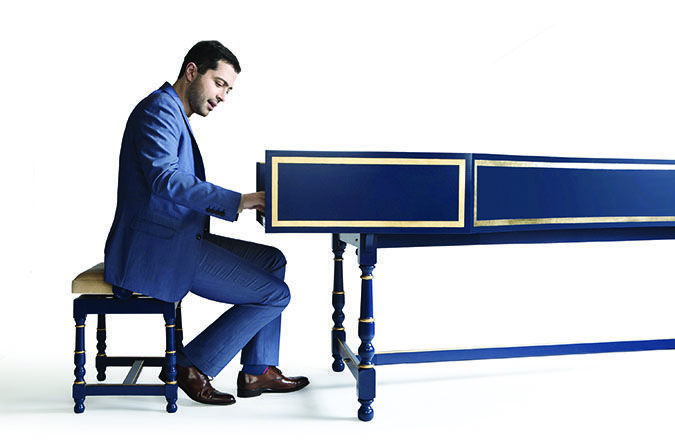Starting Nov. 12, the Los Angeles Chamber Orchestra will offer an enlightening five-concert “Baroque Conversations” series.
“The series spotlights repertoire from early Baroque schools through the pre-classical period. In signature LACO style, the artists share their insights into the music and invite questions from the audience, which provides audiences with an in-depth look at the music being presented as well as an opportunity to get to know LACO artists on a deeper level.”
The first four programs will be held at Downtown L.A.’s Zipper Hall. The series finale, a program of cello concertos, will take place at USC’s Bovard Auditorium.
As you may know, Baroque music is a style of Western music composed from approximately 1600 to 1750. The bassoon, oboe, harpsichord, flute violin and cello figure prominently. Noted composers include Bach, Telemann, Couperin and Handel.
An interesting fact from Wikipedia: “The word ‘baroque’ comes from the Portuguese word barroco, meaning misshapen pearl, a negative description of the ornate and heavily ornamented music of this period.”
Recently LACO Director of Artistic Administration Daren Fuster shared his enthusiasm for the series.
“Most of LACO’s members are also studio musicians who have recorded soundtracks for film composers such as John Williams and Danny Elfman, among others. The reason for LACO’s existence is that the musicians decided they wanted to form an artistic outlet in which to perform selections outside of their studio work.”
Every season LACO offers a number of Baroque Conversations concerts in which their musicians serve as leaders and facilitators. During the actual performance, the musicians guide the audience through the evening, from one selection to another.
A question and answer session, with a panel of the musicians on the stage and a facilitator, follows. The musicians may talk about the historical detail of each selection. They may talk about the history of their instrument during the Baroque period.
“These conversations are fascinating. They offer the audience member an opportunity, through the musician’s perspective, to learn interesting tidbits and what’s noteworthy about the repertoire. That interaction is unique. It’s a completely different experience than at, say, Disney Hall, where you go to hear large works, with orchestra and/or choir, and one piece directly follows another.”
If you’ve never been to the Colburn School’s Zipper Hall, you’re in for a treat.
“Zipper Hall is relatively brand new. The seats are comfortable. It has a stadium feel, with the seats looking down on the stage. There’s not a bad seat in the house. Acoustically, it’s a gem. You can hear every last detail from the stage, of a violin, the bow on the strings, you can hear the pick on a guitar string. The clarity is second to none.”
At about 400 seats, the hall provides an intimate experience.
“‘Making great music personal’ is one of our taglines. We’re able to provide a real connection between the musicians and the members of the audience.”
An added draw: Each Zipper Hall program begins with a wine and hors d’oeuvres reception.
The first concert features Mahan Esfahani, “an incredibly accomplished Iranian-born harpsichord player. He’ll both guide the audience through the program and lead the panel discussion after.”
The concert also features long-time LACO concertmaster Margaret Batjer. The program consists of a concerto by Bach with harpsichord and strings, an overture by Erlebach, Telemann’s Quartet in D Major, and Bach’s Sonata in G minor for Oboe and Harpsichord.
Ken Munday, LACO’S principal bassoonist, will lead Baroque Conversations 2. The program will feature works by Boismortier, Rameau, Telemann, Handel and Zackow. “These are pieces that are not widely heard,” Fuster said.
“Baroque 3 features Allan Vogel, our principal oboe player, who’s incredibly well-known, both in L.A. and throughout the world. The orchestra will be playing the Bach’s Brandenburg Concerto No. 2, which features solos for flute, oboe, trumpet and violin. Those who like Bach’s Brandenburg Concerti should know this repertoire is something we do very well.”
Baroque 4 features wunderkind Joshua Roman playing solo Bach cello suites. Baroque 5 will be at USC, the crowning feature of the Piatigorsky International Cello Festival, a 10-day cello extravaganza co-hosted by LACO, USC and the L.A. Phil, showcasing 25 international artists representing 15 countries and four continents.
The music in the Baroque Conversations series is incredibly appealing, musically and emotionally. When Joshua Roman performs the Bach cello suites on Baroque 4, for example, the intervals between the notes, the phrasing, the harmonies are as pure as music gets. Baroque music has a pristine, cleansing clarity that restores a sense of order.
“It’s like going to church, I always find,” Fuster said.
“In their day jobs, these musicians are under extreme pressure to play every single note perfectly the first time on a film-scoring session. When they come to work here, they’re thrilled to be performing the repertoire. They’re committed and they’re passionate.”
Fuster added, “With the Baroque Conversations series, what happens on the stage is magical.”

